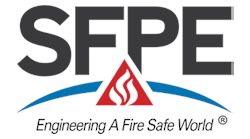Latest from Fire Sprinklers
Sponsored
Washington — An International Code Council special committee voted unanimously on Dec. 11, 2008, to reject an appeal that was filed by the National Association of Home Builders regarding ICC residential fire sprinkler code requirements that were voted on this past September during ICC's final action hearings in Minneapolis.
Governmental members supported both proposals, RB64-07/08 and RB66-07/08, requiring fire sprinklers in all new one- and two-family dwellings and townhouses. The townhouse sprinkler requirement was applied upon adoption of the new International Residential Code, and the one- and two-family dwelling sprinkler requirements will be incorporated in the 2009 IRC. The approved codes will become effective Jan. 1, 2011 in jurisdictions that do not amend the codes.
According to a report from the IRC Fire Sprinkler Coalition, states and local jurisdictions do not have to adopt these codes. However, most state and local jurisdictions do adopt codes since they standardize building and fire regulations. By having model codes, jurisdictions are relieved from managing code changes and updates.
In NAHB's appeal, dated Oct. 30, 2008, the association asked ICC to “take immediate action to eliminate the influence of third-party funding in the voting process” and “undertake corrective action(s) … by restoring the principle of balance of interest in the selection of governmental member voting representatives.”
ICC voting representatives were allotted to ICC government members based on population or agency size for the final action hearings in Minneapolis. These individuals were employees or appointees of local, state or federal government members. Other members such as plumbers, home builders, contractors, manufactures, engineers, etc., were allowed to vote on assembly actions at the code development hearings.
“Although, we as staff, do not take positions on code change proposals, we support the industry and membership in their endeavors to construct safe and efficient buildings based on the provisions within the international codes,” commented Jay Peters, executive director of plumbing, mechanical and fuel gas at the International Code Council. “The outcome and approval of these provisions by our governmental members reflect the majority vote at the hearing.”
According to Calli Schmidt, director of environmental communications at the NAHB, the association appealed the decision to mandate fire sprinklers because they did not think the voting process during the code hearings was fair or balanced. “The appeals panel met Dec. 11, and while they decided not to recommend that the vote be rescinded, they did agree that the ICC board should take a look at its voting requirements and make sure that the bylaws are being followed,” commented Schmidt.
“The bylaws state that governmental voting members be employees and also must be folks charged with enforcing the code, like fire marshalls and fire inspectors — not the firefighters themselves,” added Schmidt. “Builders aren't members either.”
ICC's Appeals Board conducted a public hearing on behalf of the ICC board of directors, where parties were permitted to provide input on the merits or lack of when looking into NAHB's claims. At the conclusion of the hearing, the Appeals Board affirmed that IRC's new fire sprinkler requirements resulted from sound actions of the ICC membership and recommended that the appeal by NAHB be rejected.
The Washington Association of Building Officials also appealed the ICC voting process. The association sent a letter to ICC communicating their concern that special interests influenced the outcome of the vote. The letter requests that ICC board of directors investigate the aspects of the voting process with an independent auditing firm, to be done transparently, and that the audit results are available to the public.
The American Fire Sprinkler association, a non-profit, international association, representing open shop fire sprinkler contractors, was in favor of the residential fire sprinkler codes that were passed and supported the adoption of the codes.
“It is a safety issue and 80% of fatal fires happen in the home,” said Steve Muncy, president of AFSA. “With this code, it would be forecasted that the number of deaths and property damage would drop dramatically.”
According to Jeffrey Shapiro, executive director at IRC Fire Sprinkler Coalition, there is a national residential fire sprinkler summit group that includes a broad array of supporters who are prepared to assist jurisdictions with adopting the 2009 IRC sprinkler provisions. community leaders, fire service members, etc.
Candace Roulo
Candace Roulo, senior editor of CONTRACTOR and graduate of Michigan State University’s College of Communication Arts & Sciences, has 15 years of industry experience in the media and construction industries. She covers a variety of mechanical contracting topics, from sustainable construction practices and policy issues affecting contractors to continuing education for industry professionals and the best business practices that contractors can implement to run successful businesses.

